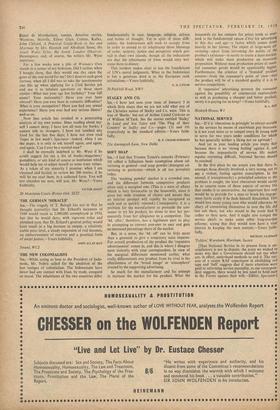SOFT SOAP SIR,-1 feel that Yvonne Tomes's remarks (February 14)
reflect a fallacious basic assumption about ad- vertising in general—and soap powder/detergent ad- vertising in particular—which is all too prevalent today.
The 'washing powder' market is a crowded one, and the difference between competitive products often only a marginal one. (This is a state of affairs which is very favourable to the housewife, since it gives her wide freedom of choice and means that an inferior product will rapidly be recognised as such and as quickly rejected.) Consequently, it is a problem for the manufacturer to persuade the con- sumer to try his product, let alone to woo her per- manently from her allegiance to a competitor. The '4d. offer,' therefore, has a legitimate part to play in attempting to convert non-user to user and gain an increased percentage share of the market.
But, in a sense, the '4d. off' can be little more than a gimmick to give a temporary sales impetus. For overall production of the product the 'expensive advertisement' comes in, and this is where I disagree most violently with your correspondent. In view of the marginal differences mentioned earlier, what really differentiates one product from its rival is the effectiveness of the 'brand image' or 'atmosphere' created by the supporting advertising.
So much for the manufacturer and his attempt to increase the market for his product. What the
housewife (in her concern for price) tends to over- look is the fundamental raison d'etre for advertising in this day and age—a factor which comes down heavily in her favour. The object of large-scale ad- vertising—apart from informing the public of the product's existence—is surely to create a mass market, which will make mass production an economic proposition. Without mass production prices of essen- tial consumer goods would be appreciably higher. Furthermore, the creation of a 'branded' product ensures—from the consumer's point of view—that the product will be of a standard quality
survive competition. if it is to
If 'expensive' advertising protects the consumer against the possibility of commercial exploitation, as well as producing a cheaper and better product, surely it is paying for its keep?—Yours faithfully, B. L. DAY Hesketh House, WI


































 Previous page
Previous page